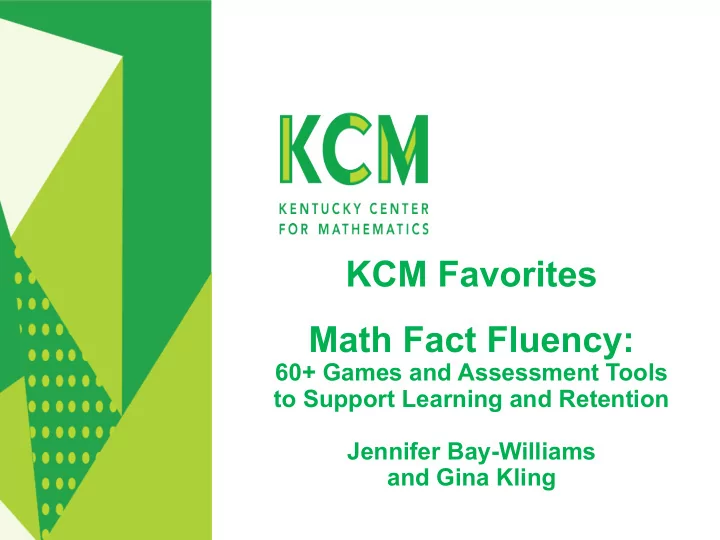

KCM Favorites Math Fact Fluency: 60+ Games and Assessment Tools to Support Learning and Retention Jennifer Bay-Williams and Gina Kling
Welcome! Your host Bonny Davenport Regional Consultant Kentucky Center for Mathematics bonny.davenport@wkec.org
KCM Website www.kentuckymathematics.org
KCM Favorite by Jennifer Bay-Williams and Gina Kling
Reasons Why I Love This Book!
About the Authors Jennifer M. Bay-Williams, PhD , is a mathematics teacher educator at the University of Louisville, Kentucky. She has written many articles and books related to K–12 mathematics education, including the popular Elementary and Middle School Mathematics: Teaching Developmentally and the related three-book series, Teaching Student-Centered Mathematics. Other recent books include Everything You Need for Mathematics Coaching, On the Money (financial literacy), and Developing Essential Understanding of Addition and Subtraction. Bay-Williams is a national leader in mathematics education, having served as a member of the National Council of Teachers of Mathematics (NCTM) Board of Directors, secretary and president of the Association of Mathematics Teacher Educators (AMTE), lead writer for the Standards for Preparing Teachers of Mathematics (AMTE, 2017), and a member of the TODOS: Mathematics for ALL Board of Directors. Bay-Williams taught elementary, middle, and high school students in Missouri and in Peru. She currently works in elementary classrooms in the Louisville area, helping teachers and students attain basic fact fluency while also developing strong mathematical identities. Follow Bay-Williams on Twitter (@JBayWilliams) or contact her directly at j.baywilliams@louisville.edu. Gina Kling is fortunate to serve the mathematics education community in a variety of ways. Since 2011, she has worked as a curriculum developer for the elementary mathematics curriculum Everyday Mathematics (based at the University of Chicago) with a focus on grades K–3. Recently she served as the grade 1 lead author for the Everyday Mathematics 4 State Editions , the author of the Everyday Mathematics 4 Quick Looks Activity Book , and one of the authors of Everyday Mathematics for Parents: What You Need to Know to Help Your Child Succeed . Kling has taught mathematics content and methods courses for the past 15 years at Western Michigan University in Kalamazoo, Michigan, and is also currently completing a doctoral degree in K–12 mathematics education at Western Michigan University. For more than a decade, Kling has focused her research on helping children learn basic math facts in meaningful ways and often shares her work through professional development with practicing teachers across the country. She has authored numerous articles on teaching and assessing basic facts and remains active in the elementary classroom today as a mathematics coach, engaging children in developing fact fluency. Kling can be contacted directly at gina.garza-kling@wmich.edu.
Podcast With the Authors
Fundamental 1: Mastery Must Focus on Fluency
Our Standards Build procedural fluency from conceptual understanding. Effective teaching of mathematics builds fluency with procedures on a foundation of conceptual understanding so that students, over time, become skillful in using procedures flexibly as they solve contextual and mathematical problems.
Fundamental 2: Fluency Develops in Three Phases Phase 1: Counting Student counts with objects or mentally. Phase 2: Deriving Uses reasoning strategies based on known facts. Phase 3: Mastery Efficiently produces answers
Fundamental 3: Foundational Facts Must Precede Derived Facts
Fundamental 3: Foundational Facts Must Precede Derived Facts
Fundamental 4: Timed Tests Do Not Assess Fluency If timed tests are not aligned with fluency, are ineffective formative assessment tools, may impede progress, and cause anxiety, why do we use them?
Timed Test Alternatives 1. Journal Writing 2. Observations 3. Interviews 4. Self Assessments 5. Strategy Quizzes
Fundamental 5: Students Need Substantial and Enjoyable Practice Games Quick Looks Stories More than 40 easy-to-make, easy-to-use games that provide engaging fact practice!
Families and Facts
KCM Favorite by Jennifer Bay-Williams and Gina Kling
KCM Favorite
Follow Us! www.kentuckymathematics.org @KyMath @KyCenterforMath
KCM is here to support you! Contact me Bonny Davenport Regional Consultant Kentucky Center for Mathematics bonny.davenport@wkec.org
Recommend
More recommend